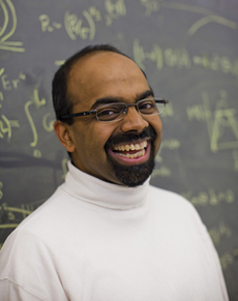The diversity of living forms led Darwin to state that it is "enough to drive the sanest man mad". How can we describe this variety? How can we understand the origin and evolution of these "endless forms most beautiful?" And how do these forms link to function and physiology at the organismic level and beyond?
Mathematics, and geometry in particular, provides a natural language to express these questions and answer them. Motivated by biological observations on different scales from molecules to organisms to swarms, I will show how a combination of quantitative experiments, physical analogies, mathematical theories and computational models allow us to begin to unravel the mechanistic basis for aspects of morphogenesis and thence towards physiology, pathophysiology and biomimetics.
The MPE2013-Simons Public Lecture Series is taking place at nine locations around the world. Each lecturer is a leading expert who explains how the mathematical sciences play a significant role in understanding and solving some of Planet Earth’s important problems. Our community’s best expositors and champions cover a diverse range of topics in lectures aimed for a public audience.
For a sneak preview of Dr. Mahadevan's research, listen to two NPR "All Things Considered" interviews that feature him:

About the Speaker
L. Mahadevan received his undergraduate education at the Indian Institute of Technology, Madras and his PhD at Stanford University. He started his independent career on the faculty of Mechanical Engineering at the Massachusetts Institute of Technology (1996-2000), following which he was the Schlumberger Professor of Complex Physical Systems in the Department of Applied Mathematics and Theoretical Physics, and a Fellow of Trinity at the University of Cambridge (2001-2003). Since 2003, he has been at Harvard University, where he is currently England de Valpine Professor of Applied Mathematics, of Physics and of Organismic and Evolutionary Biology. Since 2004, he has also been a visiting Professor at the Mathematical Institute at Oxford University.
His research interests revolve around understanding the physical and biological organization of matter and how it is shaped, moves and flows, particularly at the scale of the everyday world, and is thus amenable to immediate experience. He uses both quantitative experiments and theoretical studies to probe questions over a range of scales from the mechanics of graphene to the tectonics of plates, and from the dynamics of cytoskeletal assemblies to the neurobiology of movement. Among his awards are a Guggenheim Fellowship (2006) and a MacArthur Fellowship (2009-14).


